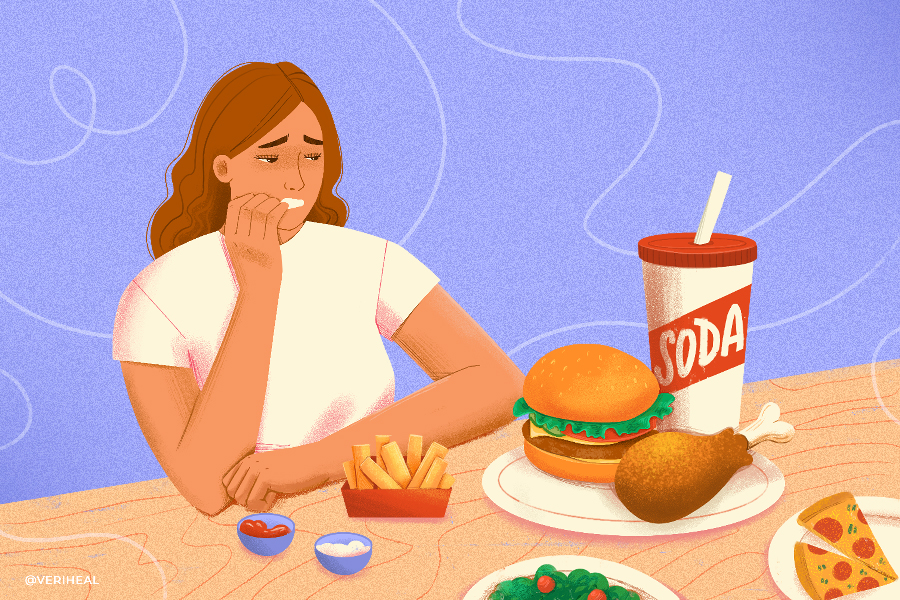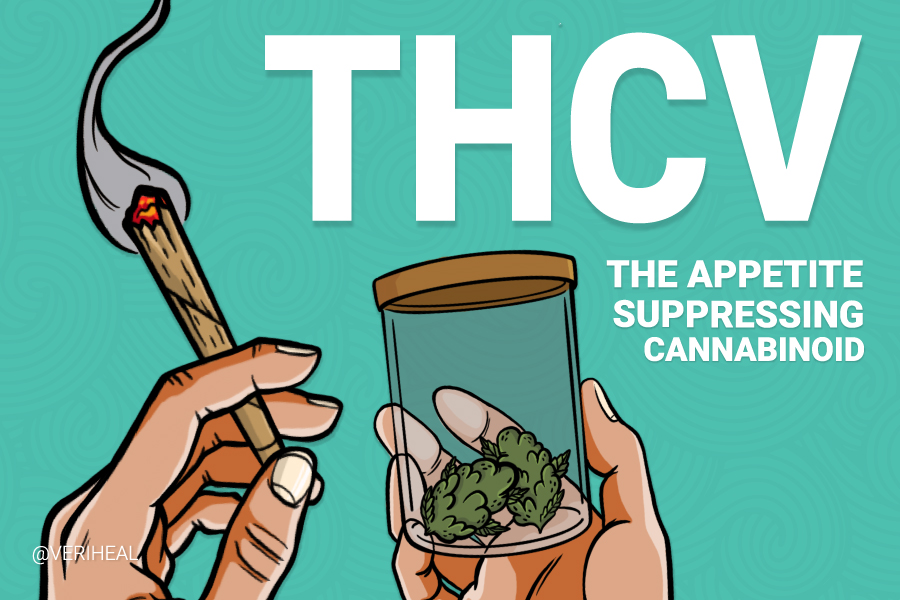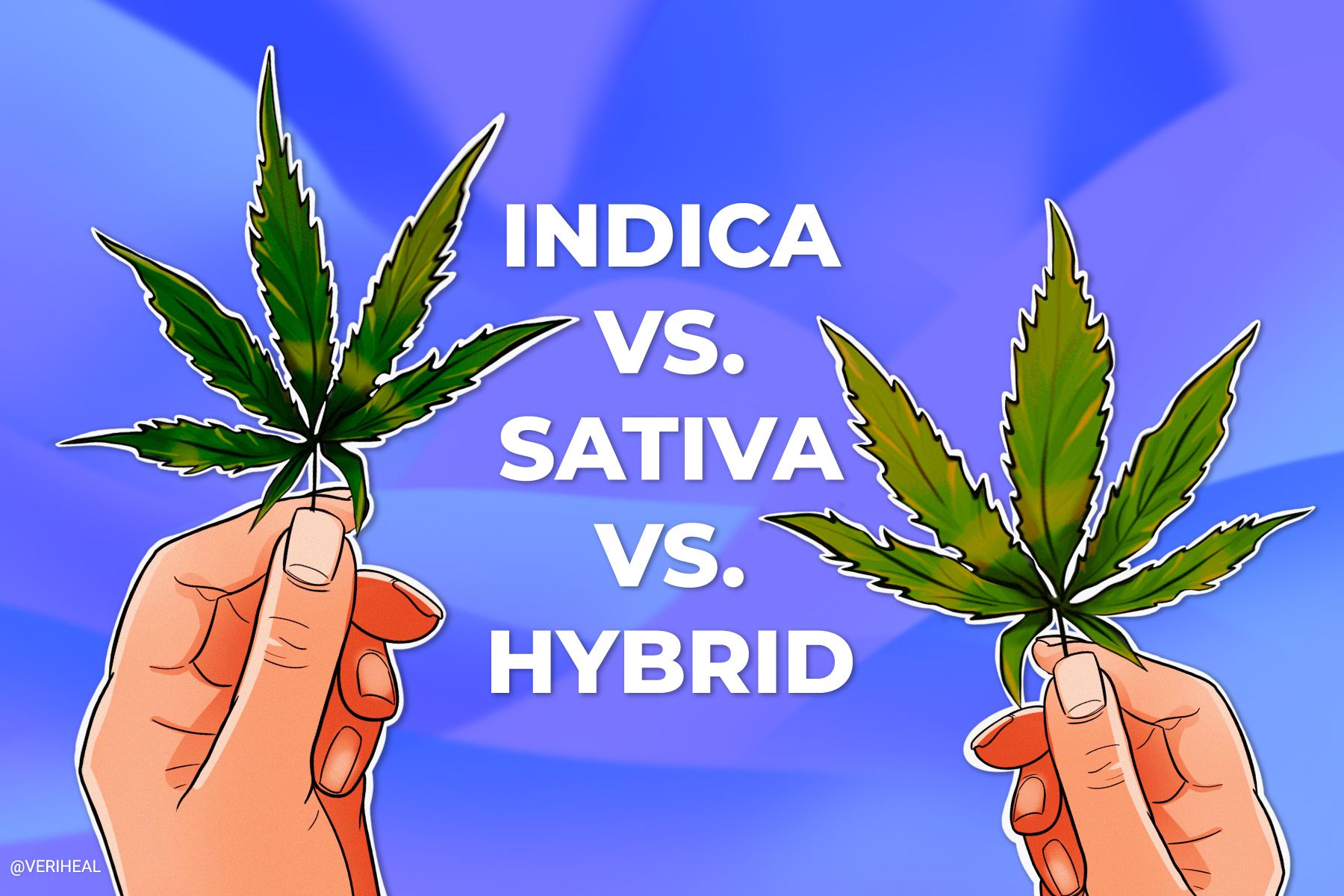Medical Cannabis for Bulimia

Bulimia nervosa is a condition where sufferers binge eat large amounts of food and later compensate via force vomiting, fasting, excessively exercising, or overusing laxatives and diuretics to avoid weight gain. “Purging” is the forced expulsion of food via vomiting or excessive laxative and diuretic use, and it is one type of bulimia. The other type of bulimia is the “non-purging” type, which involves over-exercising.
Both types involve binging on food that is uncontrollable and leads to anger, depression, or lower self-esteem. Patients will unduly judge their self-worth based on their weight or body image. Bulimia is unlike anorexia nervosa, which entails food restrictions for long periods to lose weight despite an already low body weight. However, bulimia is also life-threatening, reports the National Eating Disorder Association (NEDA) (5).
While there is no conclusive evidence that medical cannabis can treat bulimia, some studies show possible endocannabinoid relevance and short-term benefits for related or co-occurring conditions according to Eating Disorder Hope, an educational organization founded in 2005 (16).
Bulimia Nervosa Symptoms
There are dozens of emotional, behavioral, and physical signs and symptoms of bulimia. According to the NEDA prominent emotional and behavioral signs include:
- Extreme mood changes
- Withdrawal from family and friends
- Fear of eating in public
- Hoarding food in unlikely places
- Developing food rituals, and diets frequently or excessively
Physical signs of bulimia include:
- Reoccurring weight fluctuation
- Hard time focusing
- Fainting
- Brittle nails
- Dental problems
- Dry skin
- Among many others (3)
Up to 4.7 million female Americans, as well as 1.5 million males, have bulimia at some point in their life, and “there is an increased risk of suicide among individuals who have bulimia. In fact, suicide is the number one leading cause of death among people who struggle with bulimia,” reports American Addiction Centers (3).
Psychiatric Comorbidities of Bulimia
According to data from the National Comorbidity Survey Replication, 95% of individuals with bulimia) met the criteria for at least one lifetime comorbid psychiatric disorder (9). Research reveals that a significant number of patients with bulimia often have psychiatric conditions in addition to their eating disorder such as:
- anxiety disorders (PTSD, OCD, GAD, etc.)
- mood disorders (depression, bi-polar disorder, etc.)
- impulse-control disorders
- substance use disorders
- psychosis
- And many more (9)
The most common of these are: unipolar major depression (50%), specific phobia (50%), post-traumatic stress disorder (PTSD) (45%), attention-deficit/hyperactivity disorder (ADHD) (35%) and alcohol use disorder (34%).
According to further bulimia research studies, “Suicide attempts are common with bulimia nervosa and were estimated to occur in 17% of the patients. Successful treatment of bulimia nervosa can often resolve anxiety and depressive disorder. Likewise, identifying and managing comorbid psychiatric disorders improve the treatment adherence and the outcome of treatment of bulimia nervosa (17).”
It is therefore incredibly important to manage co-occurring mental health disorders as a part of treating eating disorders such as bulimia.
Medical Comorbidities of Bulimia
There are several physical health issues that are associated with bulimia including obesity, sleep disturbances, pain (eg, musculoskeletal pain, headaches), tooth decay and dental problems, gastrointestinal conditions, menstrual irregularities, shortness of breath, diabetes, hypertension, low quality of life, and functional health impairments. (17)
- Pain (musculoskeletal, headaches, etc.)
- Sleep disturbances
- Hypertension
- Fibromyalgia
- Gastrointestinal conditions (e.g. Irritable bowel syndrome) (17, 15)
Bulimia complications affect many organ systems at once including gastrointestinal, renal, cardiac, and endocrine. Serious complications can include gastric dilation from binge eating, fluid-electrolyte disturbances leading to renal failure, severe liver dysfunction, pancreatitis, and cardiac arrhythmias or heart failure requiring hospitalization. For many reasons, bulimia can increase all-cause mortality risk by two to eight times (3, 21).
Bulimia Treatments
Treatments for bulimia include psychotherapy, medications, nutrition education, and in serious cases hospitalization. At present, the combination of antidepressants with psychotherapy is viewed as one of the most effective ways of managing and overcoming this condition (14). It is important that patients with bulimia surround themselves with people or family who are supportive and boost their self-esteem. This kind of emotional support can be critical for patients with eating disorders and comorbid psychiatric conditions.
As previously stated, there is no strong evidence and research to support the claim that medical cannabis can help treat bulimia. However, there is research available that suggests cannabis may help relieve symptoms commonly associated with bulimia, and perhaps help in the overall treatment through addressing comorbid conditions that occur alongside bulimia.
Can Cannabinoids Help Treat Bulimia?
As far back as 2011, research has connected medical cannabis to eating disorders. “Scientists discovered that the brain’s marijuana-like neurotransmitter system was significantly underactive in women with either anorexia or bulimia in a part of the brain that is responsible for the integration of the taste of food with our emotional response to eating,” reports Psychology Today, adding the patients were unable to find pleasure in food, which caused them to develop rituals and adverse reactions to it (20).
The report is based on a study published in Biological Psychiatry that examined endocannabinoid activity in anorexic and bulimic patients. It found an increased number of CB1 receptors in the brain for both types, showing the body is trying to compensate for having less ECS signals (6). The ECS is involved in sensations of self-awareness, eating pleasure, reward, and emotions. Having a dysregulated ECS could underlie bulimia and its symptoms or related comorbidities, pending further research (19).
A Healthline report details two journal studies published by Nature Neuroscience studies showing how medical cannabis could increase negative food behaviors like binge eating (8).
One study focuses on how cannabis interacts with the body’s endocannabinoid system or ECS to make eating more pleasurable. Which is a complex network of receptors called endocannabinoids found throughout the body and brain. The ECS is essential for homeostasis within the body. It regulates our sleep, mood, appetite, brain electrical activity, pain perception, nausea and vomiting, memory, motor responses, and many other functions.
The focus of this study was how cannabis containing THC stimulated the CB1 receptors which causes increased appetite. Most CB1 receptors are found in the central nervous system (CNS), but they are also found in smaller numbers in the GI tract nerves, autonomic nerves, cardiovascular system, endocrine and adipose tissues, and the skin (10).
The 2015 study reports how cannabis receptor 1, referred to as CB1, is “critical for the central regulation of food intake,” while a 2014 study revealed CB1 receptors “promote food intake in fasted mice by increasing odor detection (11).”
While noting the negative side effects of medical cannabis on eating disorders, particularly binge eating, which is a facet of bulimia, Healthline reports the risk between “binge eating disorder versus overeating from marijuana.” Taking THC-containing cannabis can increase the risk of overeating, but not necessarily developing eating disorders. Importantly, people with already existing eating disorders are more likely to abuse substances like alcohol and possibly high-THC cannabis as well. Other cannabinoids like CBD and THCV are not psychoactive and have even less likely dependence potential while also possibly curbing appetite and weight gain.
While medical cannabis with THC is used short-term for anorexia patients who must gain weight, it could have adverse effects on binge eating. Due to a commonly known appetite-stimulating side-effect of consuming cannabis products known as “the munchies.”
However, alternative cannabinoids like CBD and THCV have recently shown promising research results as appetite-reducing and anti-obesity agents since they act the opposite way on CB1 receptors. While THC stimulates CB1, cannabinoids like these may antagonize CB1 receptors thus potentially reducing appetite and obesity-promoting signals in the body. They may also improve metabolic markers and profiles in obese patients. Thus, high THC cannabis should likely be avoided if you are prone to overeating already. However, further research connecting specific cannabinoids like CBD, THCV, and others to bulimia may prove to help further alleviate the disorder (1).
Medical Cannabis for Anxiety and Depression
Aside from scientific evidence connecting the endocannabinoid system to eating disorders, medical cannabis reportedly assists in depression, which could also help bulimics manage their mood disorders. Whether a strain is sativa-dominant or indica-dominant is of far less importance than its terpene and cannabinoid profile, and dosage administered. This should all be assessed by an experienced medical professional (7).
Preliminary research on the effects of different cannabis terpenes and mice shows us encouraging results in the treatment of depression and anxiety. Linalool, a terpene often found in cannabis as well as other plants such as lavender, has been found to have antidepressant effects. It works through activating neurotransmitter receptors in the brain via the ECS, ultimately impacting serotonin levels in the brain. A strain high in linalool may therefore be favorable to those seeking heightened antidepressant effects (12). Further research on the benefits and long-term effects of cannabis use and terpenes on depression is needed.
Anxiety disorders commonly occur in bulimic patients. The anxiolytic (anxiety-reducing) effects of CBD have been assessed in animal models and in small human studies. According to reviewed research, “CBD’s positive anxiolytic effects have been observed in people with generalized social anxiety disorder (SAD) and effectively treat other anxiety disorders and reduce anxiety symptoms (7).” A 2021 observational trial studied the anxiety-reducing effects of cannabis and found that medicinal cannabis use may reduce anxiety in clinically anxious populations (13).”
Research on medical cannabis and anxiety, like depression and medical cannabis, is still new and more is needed to understand the possible relief it may provide to patients with anxiety disorders (13). However, it is likely that high-THC content should be avoided because too much THC can cause anxiety.
Medical Cannabis and Pain
Pain management can be an important part of treatment for patients with bulimia. Some bulimia patients may suffer from headaches, sore throats, or other pain. Chronic pain is by far the most common condition that is cited for medical cannabis use. There is a decent body of research to support the analgesic or pain-relieving properties of cannabis (2).
There is also research that suggests incorporating medical cannabis in place of or in conjunction with opioids helps reduce opioid prescriptions and therefore opioid use amongst patients managing pain. This can be beneficial for patients because opioids produce a range of negative side effects.
A 2017 survey from the Journal of Cannabis and Cannabinoid Research found patients managing chronic pain with opioids, “overwhelmingly reported that cannabis provided relief on par with their other medications, but without the unwanted side effects. Ninety-seven percent of the sample ’strongly agreed/agreed’ that they are able to decrease the amount of opiates they consume when they also use cannabis, and 81% “strongly agreed/agreed” that taking cannabis by itself was more effective at treating their condition than taking cannabis with opioids (18).”
Medical Cannabis and Sleep Disturbances
There is preliminary research on cannabis and insomnia that supports the claim that the cannabinoid CBD may have therapeutic potential for patients with insomnia and other sleep disorders. It’s important to note that THC may actually impair the quality of sleep long-term despite having the potential to make you fall asleep faster (4). Other larger systematic reviews on cannabis and sleep have also shown therapeutic potential for cannabinoids like THC, CBD, and nabilone for sleep disorders.
If you or a loved one is living with an eating disorder such as bulimia, talk to a medical professional about medical cannabis or other cannabinoids to see if it could be a good fit for your eating disorder treatment plan.
Talk to your doctor and learn more about getting your medical marijuana card today.
Note: The content on this page is for informational purposes only and is not intended to be professional medical advice. Do not attempt to self-diagnose or prescribe treatment based on the information provided. Always consult a physician before making any decision on the treatment of a medical condition.
1. Abioye, A., Ayodele, O., Marinkovic, A., Patidar, R., Akinwekomi, A., & Sanyaolu, A. (2020). Δ9-Tetrahydrocannabivarin (THCV): A commentary on potential therapeutic benefit for the management of obesity and diabetes. Journal of Cannabis Research, 2(1). https://jcannabisresearch.biomedcentral.com/articles/10.1186/s42238-020-0016-7
2. Anand, U., Pacchetti, B., Anand, P., & Sodergren, M. H. (2021). Cannabis-based medicines and pain: A review of potential synergistic and entourage effects. Pain Management, 11(4), 395–403. https://www.futuremedicine.com/doi/10.2217/pmt-2020-0110
3. Authored by Editorial StaffLast Updated: February 23, 2022. (2022, February 24). What are the real facts about bulimia? American Addiction Centers. Retrieved June 14, 2022, from https://americanaddictioncenters.org/bulimia-treatment/facts-and-statistics
4. Babson, K. A., Sottile, J., & Morabito, D. (2017). Cannabis, cannabinoids, and sleep: A review of the literature. Current Psychiatry Reports, 19(4). https://link.springer.com/article/10.1007/s11920-017-0775-9
5. Bulimia nervosa. National Eating Disorders Association. (2018, February 22). Retrieved June 14, 2022, from https://www.nationaleatingdisorders.org/learn/by-eating-disorder/bulimia
6. Gérard, N., Pieters, G., Goffin, K., Bormans, G., & Van Laere, K. (2011). Brain type 1 cannabinoid receptor availability in patients with anorexia and bulimia nervosa. Biological Psychiatry, 70(8), 777–784. https://www.biologicalpsychiatryjournal.com/article/S0006-3223(11)00507-5/fulltext
7. Graczyk, M., Łukowicz, M., & Dzierzanowski, T. (2021). Prospects for the use of cannabinoids in psychiatric disorders. Frontiers in Psychiatry, 12. https://www.frontiersin.org/articles/10.3389/fpsyt.2021.620073/full
8. Holland, K. (2016, December 19). Binge eating disorder and marijuana: Is there a connection? Healthline. Retrieved June 14, 2022, from https://www.healthline.com/health/eating-disorders/binge-eating-disorder-and-marijuana
9. Hudson, J. I., Hiripi, E., Pope, H. G., & Kessler, R. C. (2007). The prevalence and correlates of eating disorders in the national comorbidity survey replication. Biological Psychiatry, 61(3), 348–358. https://www.ncbi.nlm.nih.gov/pmc/articles/PMC1892232/
10. Kilaru, A., & Chapman, K. D. (2020). The endocannabinoid system. Essays in Biochemistry, 64(3), 485–499. https://pubmed.ncbi.nlm.nih.gov/32648908/
11. Koch, M., Varela, L., Kim, J. G., Kim, J. D., Hernández-Nuño, F., Simonds, S. E., Castorena, C. M., Vianna, C. R., Elmquist, J. K., Morozov, Y. M., Rakic, P., Bechmann, I., Cowley, M. A., Szigeti-Buck, K., Dietrich, M. O., Gao, X.-B., Diano, S., & Horvath, T. L. (2015). Hypothalamic POMC neurons promote cannabinoid-induced feeding. Nature, 519(7541), 45–50. https://www.ncbi.nlm.nih.gov/pmc/articles/PMC7309674/
12. Li, X., Diviant, J. P., Stith, S. S., Brockelman, F., Keeling, K., Hall, B., & Vigil, J. M. (2020). The Effectiveness of Cannabis Flower for Immediate Relief from Symptoms of Depression. The Yale journal of biology and medicine, 93(2), 251–264. https://pubmed.ncbi.nlm.nih.gov/32607086/
13. Martin, E. L., Strickland, J. C., Schlienz, N. J., Munson, J., Jackson, H., Bonn-Miller, M. O., & Vandrey, R. (2021). Antidepressant and anxiolytic effects of medicinal cannabis use in an observational trial. Frontiers in Psychiatry, 12. https://pubmed.ncbi.nlm.nih.gov/34566726/
14. Mayo Foundation for Medical Education and Research. (2018, May 10). Bulimia nervosa. Mayo Clinic. Retrieved June 14, 2022, from https://www.mayoclinic.org/diseases-conditions/bulimia/diagnosis-treatment/drc-20353621
15. Mayo Foundation for Medical Education and Research. (2018, May 10). Bulimia nervosa. Mayo Clinic. Retrieved June 14, 2022, from https://www.mayoclinic.org/diseases-conditions/bulimia/symptoms-causes/syc-20353615
16. McGuire, J., & McGuire, J. (2022, June 13). Impact of medical marijuana for anorexia and bulimia. Eating Disorder Hope. Retrieved June 14, 2022, from https://www.eatingdisorderhope.com/blog/marijuana-eating-disorder-sufferers
17. Patel, R. S., Olten, B., Patel, P., Shah, K., & Mansuri, Z. (2018). Hospitalization outcomes and Comorbidities of Bulimia Nervosa: A nationwide inpatient study. Cureus. https://www.cureus.com/articles/12239-hospitalization-outcomes-and-comorbidities-of-bulimia-nervosa-a-nationwide-inpatient-study
18. Reiman, A., Welty, M., & Solomon, P. (2017). Cannabis as a substitute for opioid-based pain medication: Patient self-report. Cannabis and Cannabinoid Research, 2(1), 160–166. https://www.liebertpub.com/doi/10.1089/can.2017.0012
19. Russo, E. B. (2016). Clinical endocannabinoid deficiency reconsidered: Current research supports the theory in migraine, fibromyalgia, irritable bowel, and other treatment-resistant syndromes. Cannabis and Cannabinoid Research, 1(1), 154–165. https://www.liebertpub.com/doi/10.1089/can.2016.0009
20. Wenk, G. (2012, April 9). The connection between anorexia, bulimia, and marijuana. Psychology Today. Retrieved June 14, 2022, from https://www.psychologytoday.com/us/blog/your-brain-food/201204/the-connection-between-anorexia-bulimia-and-marijuana
21. Zunker, C., & Mitchell, J. E. (2021, January). Bulimia nervosa and binge eating disorder in adults: Medical complications and their management. UpToDate. Retrieved June 14, 2022, from https://www.uptodate.com/contents/bulimia-nervosa-and-binge-eating-disorder-in-adults-medical-complications-and-their-management








